The Impact of Ongoing Assessment on Mathematics Self-Efficacy
VerifiedAdded on 2022/08/15
|61
|14175
|15
Report
AI Summary
This report presents an action research study investigating the effects of ongoing assessment on students' self-efficacy in mathematics. The research focuses on students from band 2 or 3 schools and examines how formative assessments, including homework assignments of varying difficulty levels and daily quizzes, influence students' motivation, understanding of mathematical concepts, and anxiety levels. The study also explores the impact of the learning environment on student performance. The report analyzes the results of formative and summative tests, considering the role of self-efficacy, mathematics anxiety, and the learning environment. The study also employs the E-class system and iPad to facilitate formative assessment, improving the students' understanding of equations of a line, equation of a circle, and calculus. Findings indicate a positive correlation between ongoing assessment and improved student performance, self-efficacy, and reduced mathematics anxiety. The report includes a literature review on self-efficacy, formative and summative assessments, and the learning environment, along with research questions, methodology, results, discussion, and conclusions.
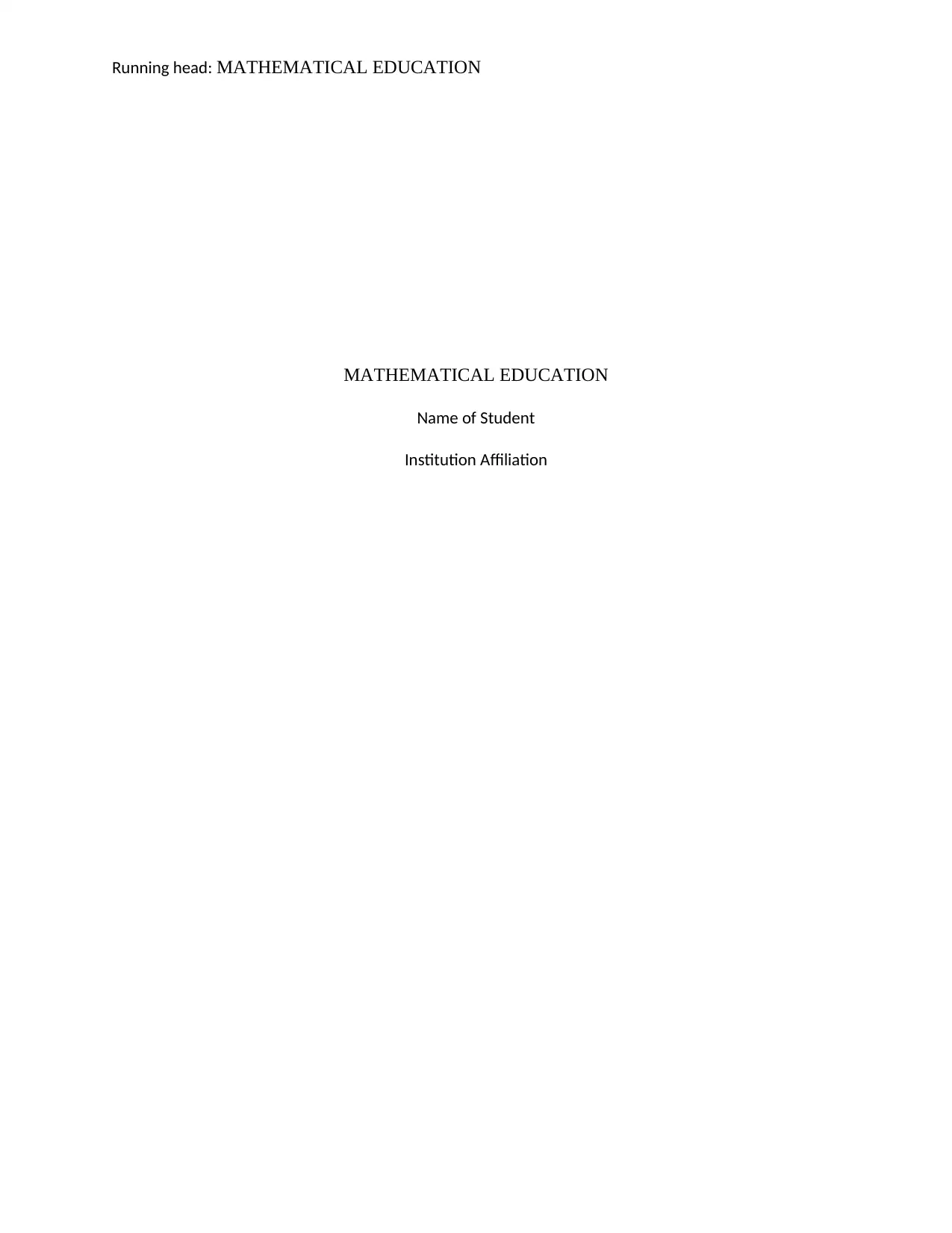
Running head: MATHEMATICAL EDUCATION
MATHEMATICAL EDUCATION
Name of Student
Institution Affiliation
MATHEMATICAL EDUCATION
Name of Student
Institution Affiliation
Paraphrase This Document
Need a fresh take? Get an instant paraphrase of this document with our AI Paraphraser
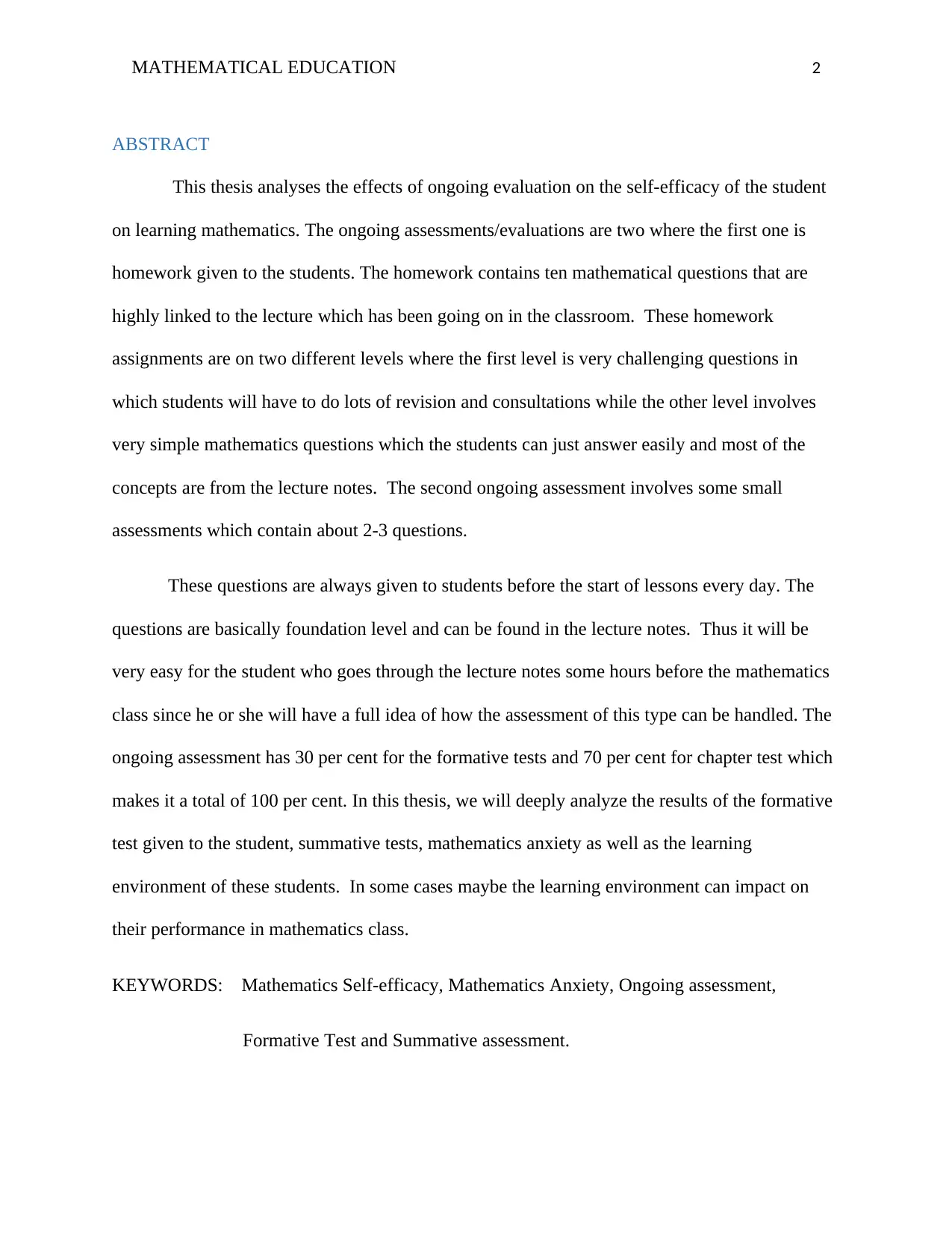
MATHEMATICAL EDUCATION 2
ABSTRACT
This thesis analyses the effects of ongoing evaluation on the self-efficacy of the student
on learning mathematics. The ongoing assessments/evaluations are two where the first one is
homework given to the students. The homework contains ten mathematical questions that are
highly linked to the lecture which has been going on in the classroom. These homework
assignments are on two different levels where the first level is very challenging questions in
which students will have to do lots of revision and consultations while the other level involves
very simple mathematics questions which the students can just answer easily and most of the
concepts are from the lecture notes. The second ongoing assessment involves some small
assessments which contain about 2-3 questions.
These questions are always given to students before the start of lessons every day. The
questions are basically foundation level and can be found in the lecture notes. Thus it will be
very easy for the student who goes through the lecture notes some hours before the mathematics
class since he or she will have a full idea of how the assessment of this type can be handled. The
ongoing assessment has 30 per cent for the formative tests and 70 per cent for chapter test which
makes it a total of 100 per cent. In this thesis, we will deeply analyze the results of the formative
test given to the student, summative tests, mathematics anxiety as well as the learning
environment of these students. In some cases maybe the learning environment can impact on
their performance in mathematics class.
KEYWORDS: Mathematics Self-efficacy, Mathematics Anxiety, Ongoing assessment,
Formative Test and Summative assessment.
ABSTRACT
This thesis analyses the effects of ongoing evaluation on the self-efficacy of the student
on learning mathematics. The ongoing assessments/evaluations are two where the first one is
homework given to the students. The homework contains ten mathematical questions that are
highly linked to the lecture which has been going on in the classroom. These homework
assignments are on two different levels where the first level is very challenging questions in
which students will have to do lots of revision and consultations while the other level involves
very simple mathematics questions which the students can just answer easily and most of the
concepts are from the lecture notes. The second ongoing assessment involves some small
assessments which contain about 2-3 questions.
These questions are always given to students before the start of lessons every day. The
questions are basically foundation level and can be found in the lecture notes. Thus it will be
very easy for the student who goes through the lecture notes some hours before the mathematics
class since he or she will have a full idea of how the assessment of this type can be handled. The
ongoing assessment has 30 per cent for the formative tests and 70 per cent for chapter test which
makes it a total of 100 per cent. In this thesis, we will deeply analyze the results of the formative
test given to the student, summative tests, mathematics anxiety as well as the learning
environment of these students. In some cases maybe the learning environment can impact on
their performance in mathematics class.
KEYWORDS: Mathematics Self-efficacy, Mathematics Anxiety, Ongoing assessment,
Formative Test and Summative assessment.
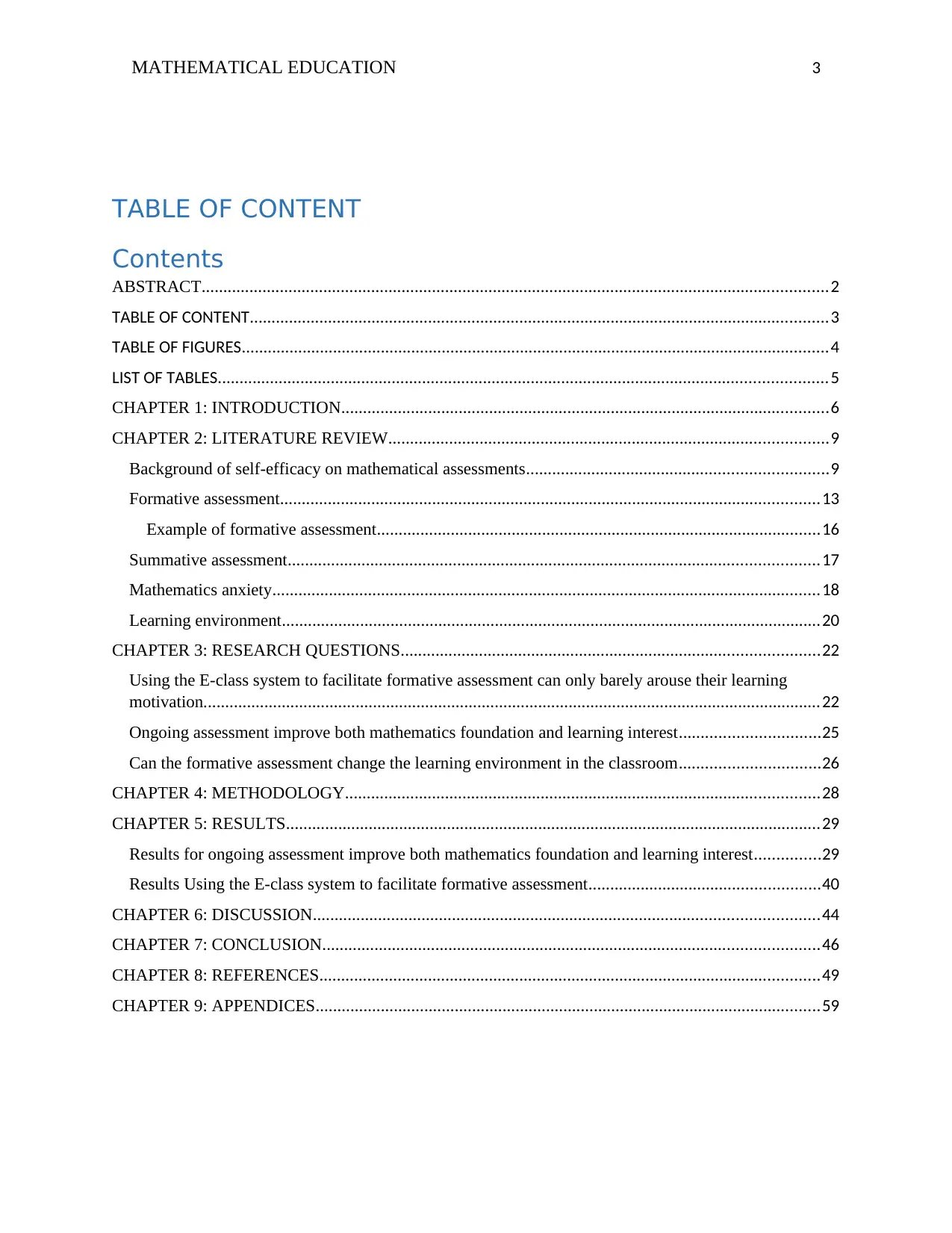
MATHEMATICAL EDUCATION 3
TABLE OF CONTENT
Contents
ABSTRACT................................................................................................................................................2
TABLE OF CONTENT.....................................................................................................................................3
TABLE OF FIGURES.......................................................................................................................................4
LIST OF TABLES............................................................................................................................................5
CHAPTER 1: INTRODUCTION................................................................................................................6
CHAPTER 2: LITERATURE REVIEW.....................................................................................................9
Background of self-efficacy on mathematical assessments.....................................................................9
Formative assessment............................................................................................................................13
Example of formative assessment......................................................................................................16
Summative assessment..........................................................................................................................17
Mathematics anxiety..............................................................................................................................18
Learning environment............................................................................................................................20
CHAPTER 3: RESEARCH QUESTIONS................................................................................................22
Using the E-class system to facilitate formative assessment can only barely arouse their learning
motivation..............................................................................................................................................22
Ongoing assessment improve both mathematics foundation and learning interest................................25
Can the formative assessment change the learning environment in the classroom................................26
CHAPTER 4: METHODOLOGY.............................................................................................................28
CHAPTER 5: RESULTS...........................................................................................................................29
Results for ongoing assessment improve both mathematics foundation and learning interest...............29
Results Using the E-class system to facilitate formative assessment.....................................................40
CHAPTER 6: DISCUSSION....................................................................................................................44
CHAPTER 7: CONCLUSION..................................................................................................................46
CHAPTER 8: REFERENCES...................................................................................................................49
CHAPTER 9: APPENDICES....................................................................................................................59
TABLE OF CONTENT
Contents
ABSTRACT................................................................................................................................................2
TABLE OF CONTENT.....................................................................................................................................3
TABLE OF FIGURES.......................................................................................................................................4
LIST OF TABLES............................................................................................................................................5
CHAPTER 1: INTRODUCTION................................................................................................................6
CHAPTER 2: LITERATURE REVIEW.....................................................................................................9
Background of self-efficacy on mathematical assessments.....................................................................9
Formative assessment............................................................................................................................13
Example of formative assessment......................................................................................................16
Summative assessment..........................................................................................................................17
Mathematics anxiety..............................................................................................................................18
Learning environment............................................................................................................................20
CHAPTER 3: RESEARCH QUESTIONS................................................................................................22
Using the E-class system to facilitate formative assessment can only barely arouse their learning
motivation..............................................................................................................................................22
Ongoing assessment improve both mathematics foundation and learning interest................................25
Can the formative assessment change the learning environment in the classroom................................26
CHAPTER 4: METHODOLOGY.............................................................................................................28
CHAPTER 5: RESULTS...........................................................................................................................29
Results for ongoing assessment improve both mathematics foundation and learning interest...............29
Results Using the E-class system to facilitate formative assessment.....................................................40
CHAPTER 6: DISCUSSION....................................................................................................................44
CHAPTER 7: CONCLUSION..................................................................................................................46
CHAPTER 8: REFERENCES...................................................................................................................49
CHAPTER 9: APPENDICES....................................................................................................................59
⊘ This is a preview!⊘
Do you want full access?
Subscribe today to unlock all pages.

Trusted by 1+ million students worldwide
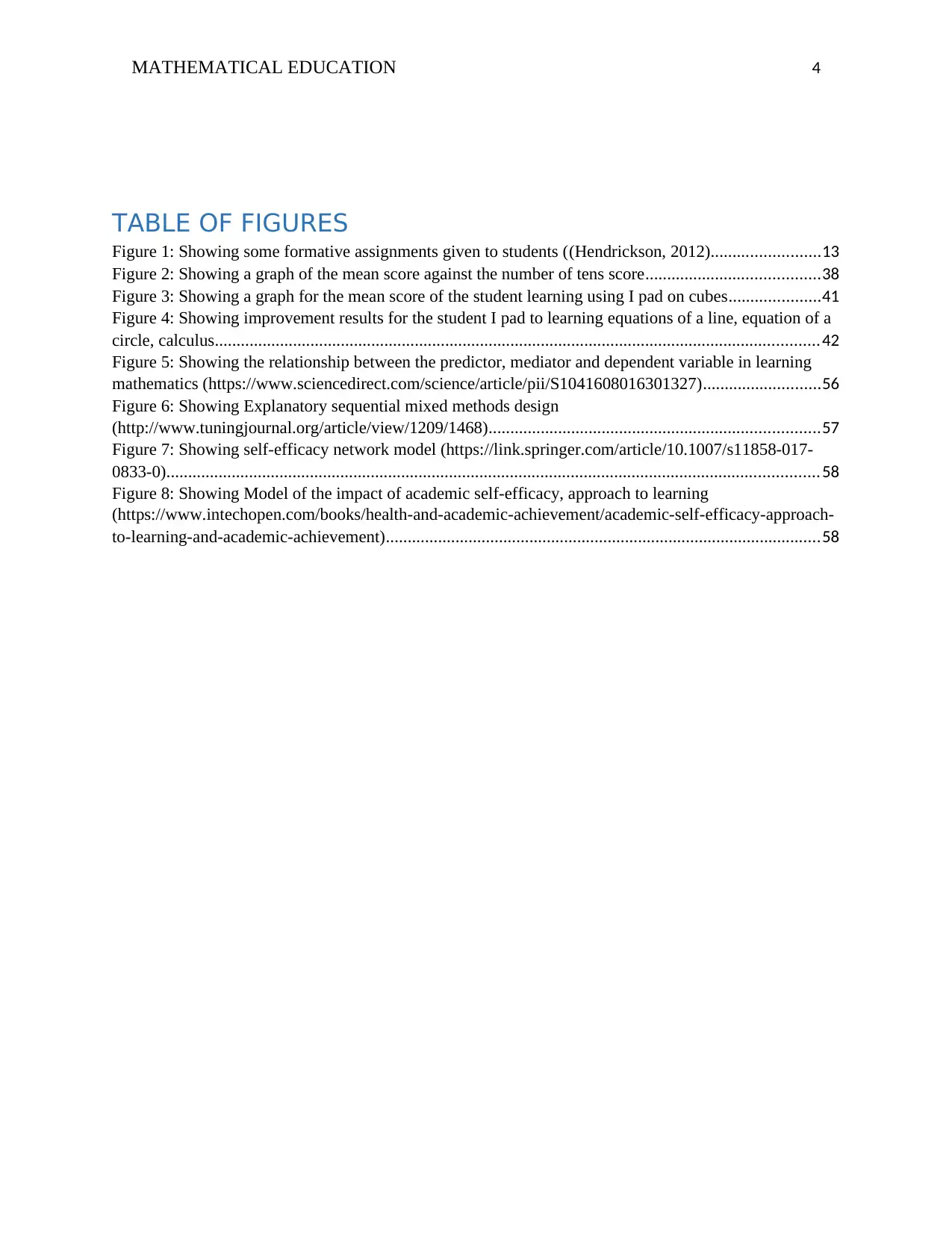
MATHEMATICAL EDUCATION 4
TABLE OF FIGURES
Figure 1: Showing some formative assignments given to students ((Hendrickson, 2012).........................13
Figure 2: Showing a graph of the mean score against the number of tens score........................................38
Figure 3: Showing a graph for the mean score of the student learning using I pad on cubes.....................41
Figure 4: Showing improvement results for the student I pad to learning equations of a line, equation of a
circle, calculus...........................................................................................................................................42
Figure 5: Showing the relationship between the predictor, mediator and dependent variable in learning
mathematics (https://www.sciencedirect.com/science/article/pii/S1041608016301327)...........................56
Figure 6: Showing Explanatory sequential mixed methods design
(http://www.tuningjournal.org/article/view/1209/1468)............................................................................57
Figure 7: Showing self-efficacy network model (https://link.springer.com/article/10.1007/s11858-017-
0833-0)......................................................................................................................................................58
Figure 8: Showing Model of the impact of academic self-efficacy, approach to learning
(https://www.intechopen.com/books/health-and-academic-achievement/academic-self-efficacy-approach-
to-learning-and-academic-achievement)....................................................................................................58
TABLE OF FIGURES
Figure 1: Showing some formative assignments given to students ((Hendrickson, 2012).........................13
Figure 2: Showing a graph of the mean score against the number of tens score........................................38
Figure 3: Showing a graph for the mean score of the student learning using I pad on cubes.....................41
Figure 4: Showing improvement results for the student I pad to learning equations of a line, equation of a
circle, calculus...........................................................................................................................................42
Figure 5: Showing the relationship between the predictor, mediator and dependent variable in learning
mathematics (https://www.sciencedirect.com/science/article/pii/S1041608016301327)...........................56
Figure 6: Showing Explanatory sequential mixed methods design
(http://www.tuningjournal.org/article/view/1209/1468)............................................................................57
Figure 7: Showing self-efficacy network model (https://link.springer.com/article/10.1007/s11858-017-
0833-0)......................................................................................................................................................58
Figure 8: Showing Model of the impact of academic self-efficacy, approach to learning
(https://www.intechopen.com/books/health-and-academic-achievement/academic-self-efficacy-approach-
to-learning-and-academic-achievement)....................................................................................................58
Paraphrase This Document
Need a fresh take? Get an instant paraphrase of this document with our AI Paraphraser
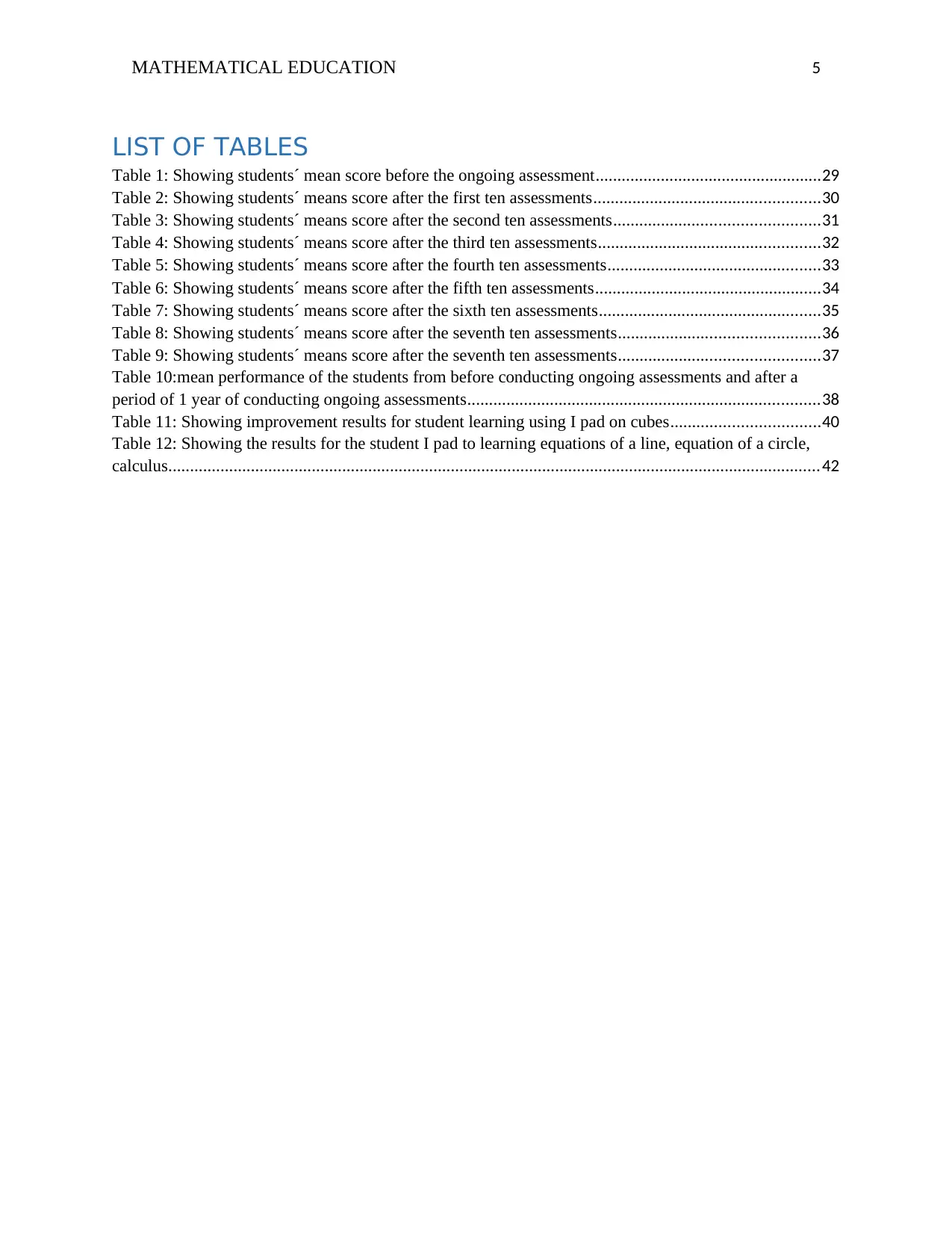
MATHEMATICAL EDUCATION 5
LIST OF TABLES
Table 1: Showing students´ mean score before the ongoing assessment....................................................29
Table 2: Showing students´ means score after the first ten assessments....................................................30
Table 3: Showing students´ means score after the second ten assessments...............................................31
Table 4: Showing students´ means score after the third ten assessments...................................................32
Table 5: Showing students´ means score after the fourth ten assessments.................................................33
Table 6: Showing students´ means score after the fifth ten assessments....................................................34
Table 7: Showing students´ means score after the sixth ten assessments...................................................35
Table 8: Showing students´ means score after the seventh ten assessments..............................................36
Table 9: Showing students´ means score after the seventh ten assessments..............................................37
Table 10:mean performance of the students from before conducting ongoing assessments and after a
period of 1 year of conducting ongoing assessments.................................................................................38
Table 11: Showing improvement results for student learning using I pad on cubes..................................40
Table 12: Showing the results for the student I pad to learning equations of a line, equation of a circle,
calculus......................................................................................................................................................42
LIST OF TABLES
Table 1: Showing students´ mean score before the ongoing assessment....................................................29
Table 2: Showing students´ means score after the first ten assessments....................................................30
Table 3: Showing students´ means score after the second ten assessments...............................................31
Table 4: Showing students´ means score after the third ten assessments...................................................32
Table 5: Showing students´ means score after the fourth ten assessments.................................................33
Table 6: Showing students´ means score after the fifth ten assessments....................................................34
Table 7: Showing students´ means score after the sixth ten assessments...................................................35
Table 8: Showing students´ means score after the seventh ten assessments..............................................36
Table 9: Showing students´ means score after the seventh ten assessments..............................................37
Table 10:mean performance of the students from before conducting ongoing assessments and after a
period of 1 year of conducting ongoing assessments.................................................................................38
Table 11: Showing improvement results for student learning using I pad on cubes..................................40
Table 12: Showing the results for the student I pad to learning equations of a line, equation of a circle,
calculus......................................................................................................................................................42
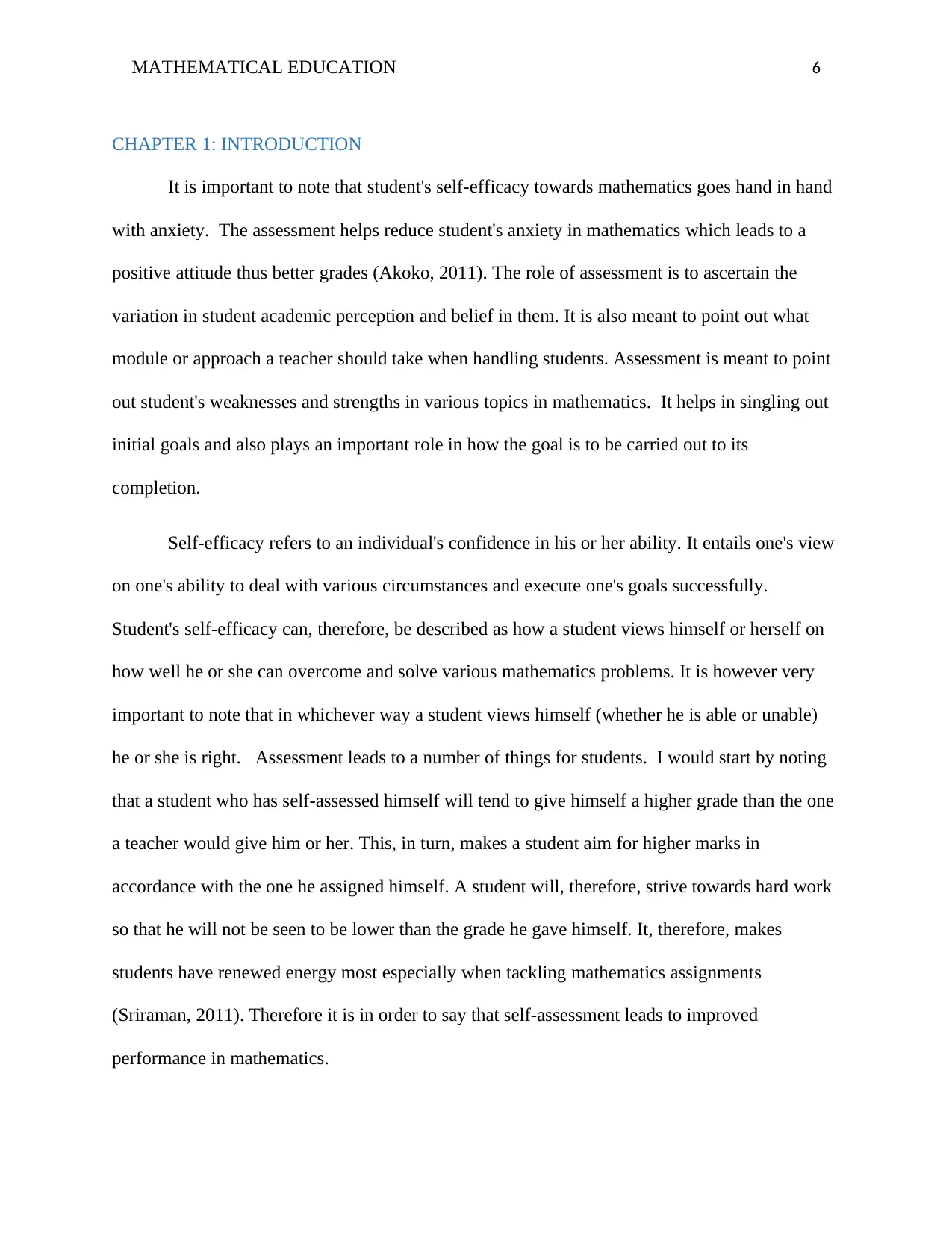
MATHEMATICAL EDUCATION 6
CHAPTER 1: INTRODUCTION
It is important to note that student's self-efficacy towards mathematics goes hand in hand
with anxiety. The assessment helps reduce student's anxiety in mathematics which leads to a
positive attitude thus better grades (Akoko, 2011). The role of assessment is to ascertain the
variation in student academic perception and belief in them. It is also meant to point out what
module or approach a teacher should take when handling students. Assessment is meant to point
out student's weaknesses and strengths in various topics in mathematics. It helps in singling out
initial goals and also plays an important role in how the goal is to be carried out to its
completion.
Self-efficacy refers to an individual's confidence in his or her ability. It entails one's view
on one's ability to deal with various circumstances and execute one's goals successfully.
Student's self-efficacy can, therefore, be described as how a student views himself or herself on
how well he or she can overcome and solve various mathematics problems. It is however very
important to note that in whichever way a student views himself (whether he is able or unable)
he or she is right. Assessment leads to a number of things for students. I would start by noting
that a student who has self-assessed himself will tend to give himself a higher grade than the one
a teacher would give him or her. This, in turn, makes a student aim for higher marks in
accordance with the one he assigned himself. A student will, therefore, strive towards hard work
so that he will not be seen to be lower than the grade he gave himself. It, therefore, makes
students have renewed energy most especially when tackling mathematics assignments
(Sriraman, 2011). Therefore it is in order to say that self-assessment leads to improved
performance in mathematics.
CHAPTER 1: INTRODUCTION
It is important to note that student's self-efficacy towards mathematics goes hand in hand
with anxiety. The assessment helps reduce student's anxiety in mathematics which leads to a
positive attitude thus better grades (Akoko, 2011). The role of assessment is to ascertain the
variation in student academic perception and belief in them. It is also meant to point out what
module or approach a teacher should take when handling students. Assessment is meant to point
out student's weaknesses and strengths in various topics in mathematics. It helps in singling out
initial goals and also plays an important role in how the goal is to be carried out to its
completion.
Self-efficacy refers to an individual's confidence in his or her ability. It entails one's view
on one's ability to deal with various circumstances and execute one's goals successfully.
Student's self-efficacy can, therefore, be described as how a student views himself or herself on
how well he or she can overcome and solve various mathematics problems. It is however very
important to note that in whichever way a student views himself (whether he is able or unable)
he or she is right. Assessment leads to a number of things for students. I would start by noting
that a student who has self-assessed himself will tend to give himself a higher grade than the one
a teacher would give him or her. This, in turn, makes a student aim for higher marks in
accordance with the one he assigned himself. A student will, therefore, strive towards hard work
so that he will not be seen to be lower than the grade he gave himself. It, therefore, makes
students have renewed energy most especially when tackling mathematics assignments
(Sriraman, 2011). Therefore it is in order to say that self-assessment leads to improved
performance in mathematics.
⊘ This is a preview!⊘
Do you want full access?
Subscribe today to unlock all pages.

Trusted by 1+ million students worldwide
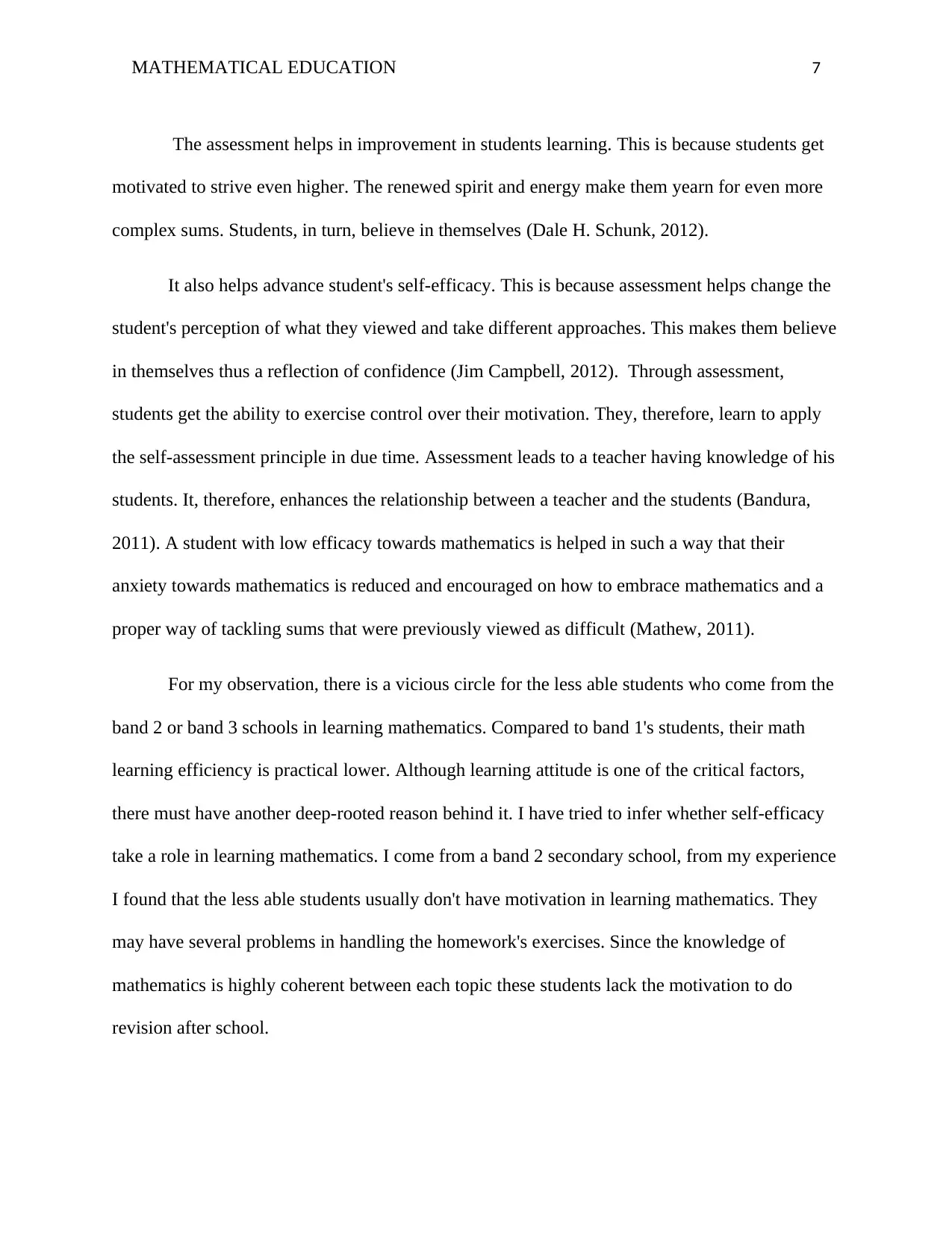
MATHEMATICAL EDUCATION 7
The assessment helps in improvement in students learning. This is because students get
motivated to strive even higher. The renewed spirit and energy make them yearn for even more
complex sums. Students, in turn, believe in themselves (Dale H. Schunk, 2012).
It also helps advance student's self-efficacy. This is because assessment helps change the
student's perception of what they viewed and take different approaches. This makes them believe
in themselves thus a reflection of confidence (Jim Campbell, 2012). Through assessment,
students get the ability to exercise control over their motivation. They, therefore, learn to apply
the self-assessment principle in due time. Assessment leads to a teacher having knowledge of his
students. It, therefore, enhances the relationship between a teacher and the students (Bandura,
2011). A student with low efficacy towards mathematics is helped in such a way that their
anxiety towards mathematics is reduced and encouraged on how to embrace mathematics and a
proper way of tackling sums that were previously viewed as difficult (Mathew, 2011).
For my observation, there is a vicious circle for the less able students who come from the
band 2 or band 3 schools in learning mathematics. Compared to band 1's students, their math
learning efficiency is practical lower. Although learning attitude is one of the critical factors,
there must have another deep-rooted reason behind it. I have tried to infer whether self-efficacy
take a role in learning mathematics. I come from a band 2 secondary school, from my experience
I found that the less able students usually don't have motivation in learning mathematics. They
may have several problems in handling the homework's exercises. Since the knowledge of
mathematics is highly coherent between each topic these students lack the motivation to do
revision after school.
The assessment helps in improvement in students learning. This is because students get
motivated to strive even higher. The renewed spirit and energy make them yearn for even more
complex sums. Students, in turn, believe in themselves (Dale H. Schunk, 2012).
It also helps advance student's self-efficacy. This is because assessment helps change the
student's perception of what they viewed and take different approaches. This makes them believe
in themselves thus a reflection of confidence (Jim Campbell, 2012). Through assessment,
students get the ability to exercise control over their motivation. They, therefore, learn to apply
the self-assessment principle in due time. Assessment leads to a teacher having knowledge of his
students. It, therefore, enhances the relationship between a teacher and the students (Bandura,
2011). A student with low efficacy towards mathematics is helped in such a way that their
anxiety towards mathematics is reduced and encouraged on how to embrace mathematics and a
proper way of tackling sums that were previously viewed as difficult (Mathew, 2011).
For my observation, there is a vicious circle for the less able students who come from the
band 2 or band 3 schools in learning mathematics. Compared to band 1's students, their math
learning efficiency is practical lower. Although learning attitude is one of the critical factors,
there must have another deep-rooted reason behind it. I have tried to infer whether self-efficacy
take a role in learning mathematics. I come from a band 2 secondary school, from my experience
I found that the less able students usually don't have motivation in learning mathematics. They
may have several problems in handling the homework's exercises. Since the knowledge of
mathematics is highly coherent between each topic these students lack the motivation to do
revision after school.
Paraphrase This Document
Need a fresh take? Get an instant paraphrase of this document with our AI Paraphraser
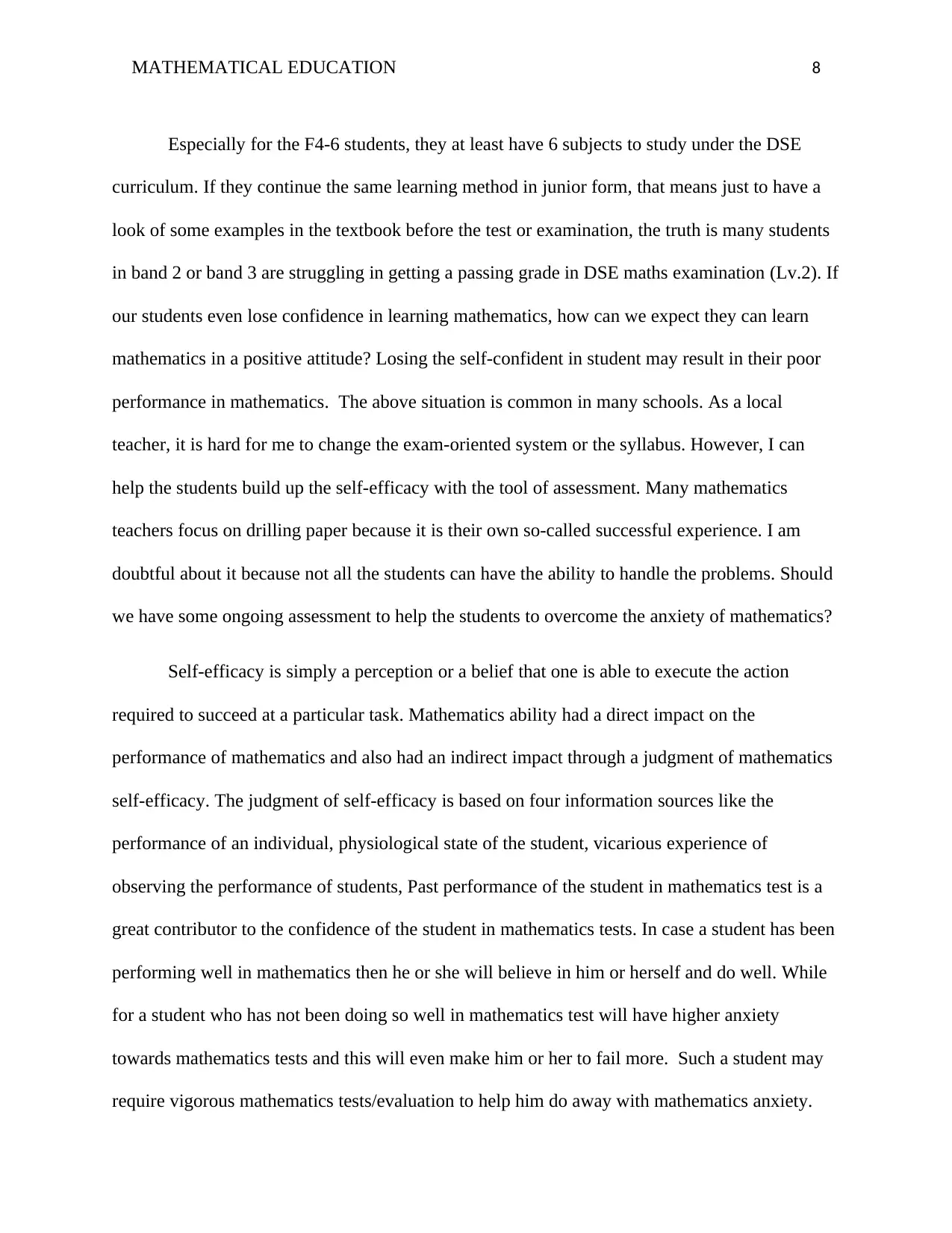
MATHEMATICAL EDUCATION 8
Especially for the F4-6 students, they at least have 6 subjects to study under the DSE
curriculum. If they continue the same learning method in junior form, that means just to have a
look of some examples in the textbook before the test or examination, the truth is many students
in band 2 or band 3 are struggling in getting a passing grade in DSE maths examination (Lv.2). If
our students even lose confidence in learning mathematics, how can we expect they can learn
mathematics in a positive attitude? Losing the self-confident in student may result in their poor
performance in mathematics. The above situation is common in many schools. As a local
teacher, it is hard for me to change the exam-oriented system or the syllabus. However, I can
help the students build up the self-efficacy with the tool of assessment. Many mathematics
teachers focus on drilling paper because it is their own so-called successful experience. I am
doubtful about it because not all the students can have the ability to handle the problems. Should
we have some ongoing assessment to help the students to overcome the anxiety of mathematics?
Self-efficacy is simply a perception or a belief that one is able to execute the action
required to succeed at a particular task. Mathematics ability had a direct impact on the
performance of mathematics and also had an indirect impact through a judgment of mathematics
self-efficacy. The judgment of self-efficacy is based on four information sources like the
performance of an individual, physiological state of the student, vicarious experience of
observing the performance of students, Past performance of the student in mathematics test is a
great contributor to the confidence of the student in mathematics tests. In case a student has been
performing well in mathematics then he or she will believe in him or herself and do well. While
for a student who has not been doing so well in mathematics test will have higher anxiety
towards mathematics tests and this will even make him or her to fail more. Such a student may
require vigorous mathematics tests/evaluation to help him do away with mathematics anxiety.
Especially for the F4-6 students, they at least have 6 subjects to study under the DSE
curriculum. If they continue the same learning method in junior form, that means just to have a
look of some examples in the textbook before the test or examination, the truth is many students
in band 2 or band 3 are struggling in getting a passing grade in DSE maths examination (Lv.2). If
our students even lose confidence in learning mathematics, how can we expect they can learn
mathematics in a positive attitude? Losing the self-confident in student may result in their poor
performance in mathematics. The above situation is common in many schools. As a local
teacher, it is hard for me to change the exam-oriented system or the syllabus. However, I can
help the students build up the self-efficacy with the tool of assessment. Many mathematics
teachers focus on drilling paper because it is their own so-called successful experience. I am
doubtful about it because not all the students can have the ability to handle the problems. Should
we have some ongoing assessment to help the students to overcome the anxiety of mathematics?
Self-efficacy is simply a perception or a belief that one is able to execute the action
required to succeed at a particular task. Mathematics ability had a direct impact on the
performance of mathematics and also had an indirect impact through a judgment of mathematics
self-efficacy. The judgment of self-efficacy is based on four information sources like the
performance of an individual, physiological state of the student, vicarious experience of
observing the performance of students, Past performance of the student in mathematics test is a
great contributor to the confidence of the student in mathematics tests. In case a student has been
performing well in mathematics then he or she will believe in him or herself and do well. While
for a student who has not been doing so well in mathematics test will have higher anxiety
towards mathematics tests and this will even make him or her to fail more. Such a student may
require vigorous mathematics tests/evaluation to help him do away with mathematics anxiety.
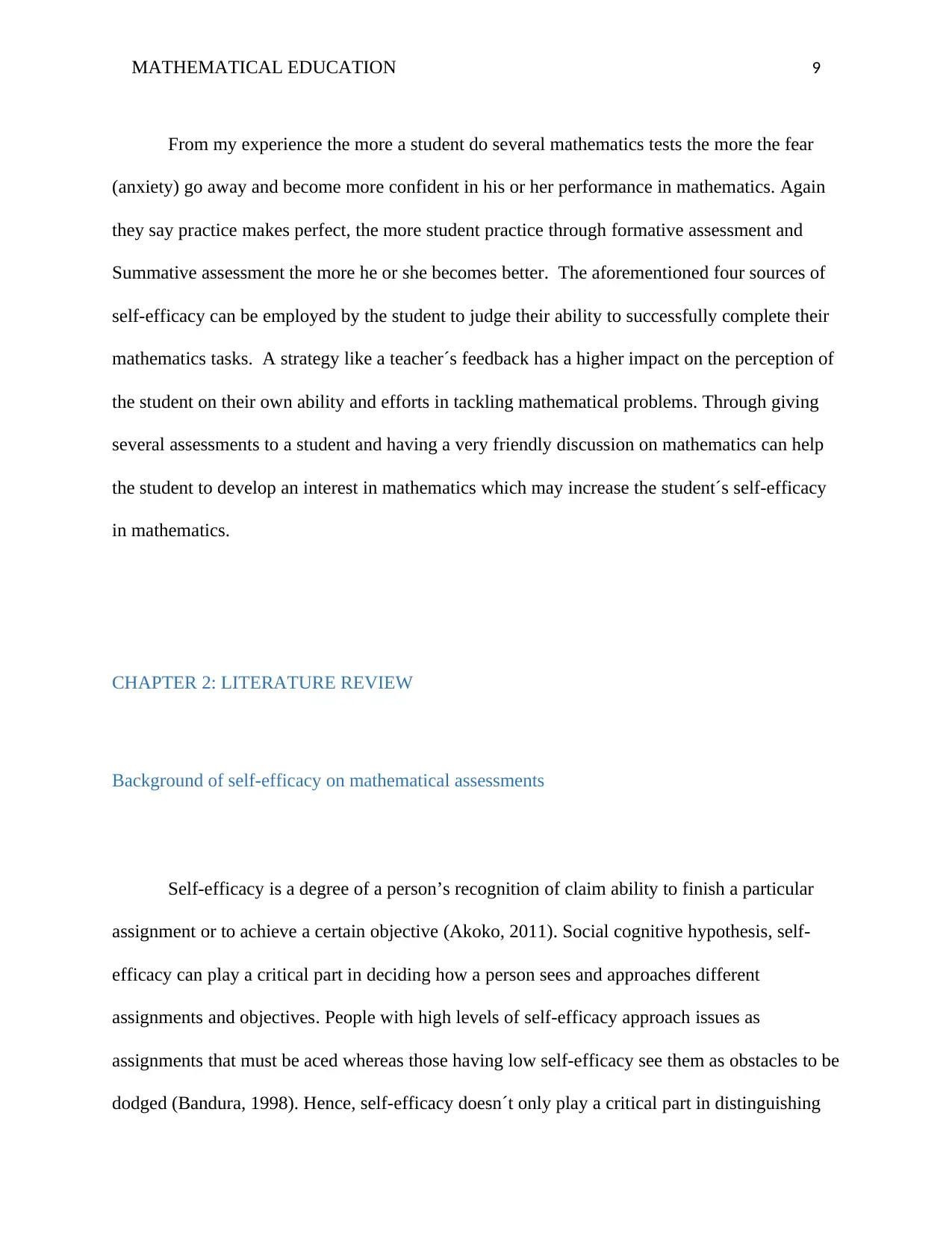
MATHEMATICAL EDUCATION 9
From my experience the more a student do several mathematics tests the more the fear
(anxiety) go away and become more confident in his or her performance in mathematics. Again
they say practice makes perfect, the more student practice through formative assessment and
Summative assessment the more he or she becomes better. The aforementioned four sources of
self-efficacy can be employed by the student to judge their ability to successfully complete their
mathematics tasks. A strategy like a teacher´s feedback has a higher impact on the perception of
the student on their own ability and efforts in tackling mathematical problems. Through giving
several assessments to a student and having a very friendly discussion on mathematics can help
the student to develop an interest in mathematics which may increase the student´s self-efficacy
in mathematics.
CHAPTER 2: LITERATURE REVIEW
Background of self-efficacy on mathematical assessments
Self-efficacy is a degree of a person’s recognition of claim ability to finish a particular
assignment or to achieve a certain objective (Akoko, 2011). Social cognitive hypothesis, self-
efficacy can play a critical part in deciding how a person sees and approaches different
assignments and objectives. People with high levels of self-efficacy approach issues as
assignments that must be aced whereas those having low self-efficacy see them as obstacles to be
dodged (Bandura, 1998). Hence, self-efficacy doesn´t only play a critical part in distinguishing
From my experience the more a student do several mathematics tests the more the fear
(anxiety) go away and become more confident in his or her performance in mathematics. Again
they say practice makes perfect, the more student practice through formative assessment and
Summative assessment the more he or she becomes better. The aforementioned four sources of
self-efficacy can be employed by the student to judge their ability to successfully complete their
mathematics tasks. A strategy like a teacher´s feedback has a higher impact on the perception of
the student on their own ability and efforts in tackling mathematical problems. Through giving
several assessments to a student and having a very friendly discussion on mathematics can help
the student to develop an interest in mathematics which may increase the student´s self-efficacy
in mathematics.
CHAPTER 2: LITERATURE REVIEW
Background of self-efficacy on mathematical assessments
Self-efficacy is a degree of a person’s recognition of claim ability to finish a particular
assignment or to achieve a certain objective (Akoko, 2011). Social cognitive hypothesis, self-
efficacy can play a critical part in deciding how a person sees and approaches different
assignments and objectives. People with high levels of self-efficacy approach issues as
assignments that must be aced whereas those having low self-efficacy see them as obstacles to be
dodged (Bandura, 1998). Hence, self-efficacy doesn´t only play a critical part in distinguishing
⊘ This is a preview!⊘
Do you want full access?
Subscribe today to unlock all pages.

Trusted by 1+ million students worldwide
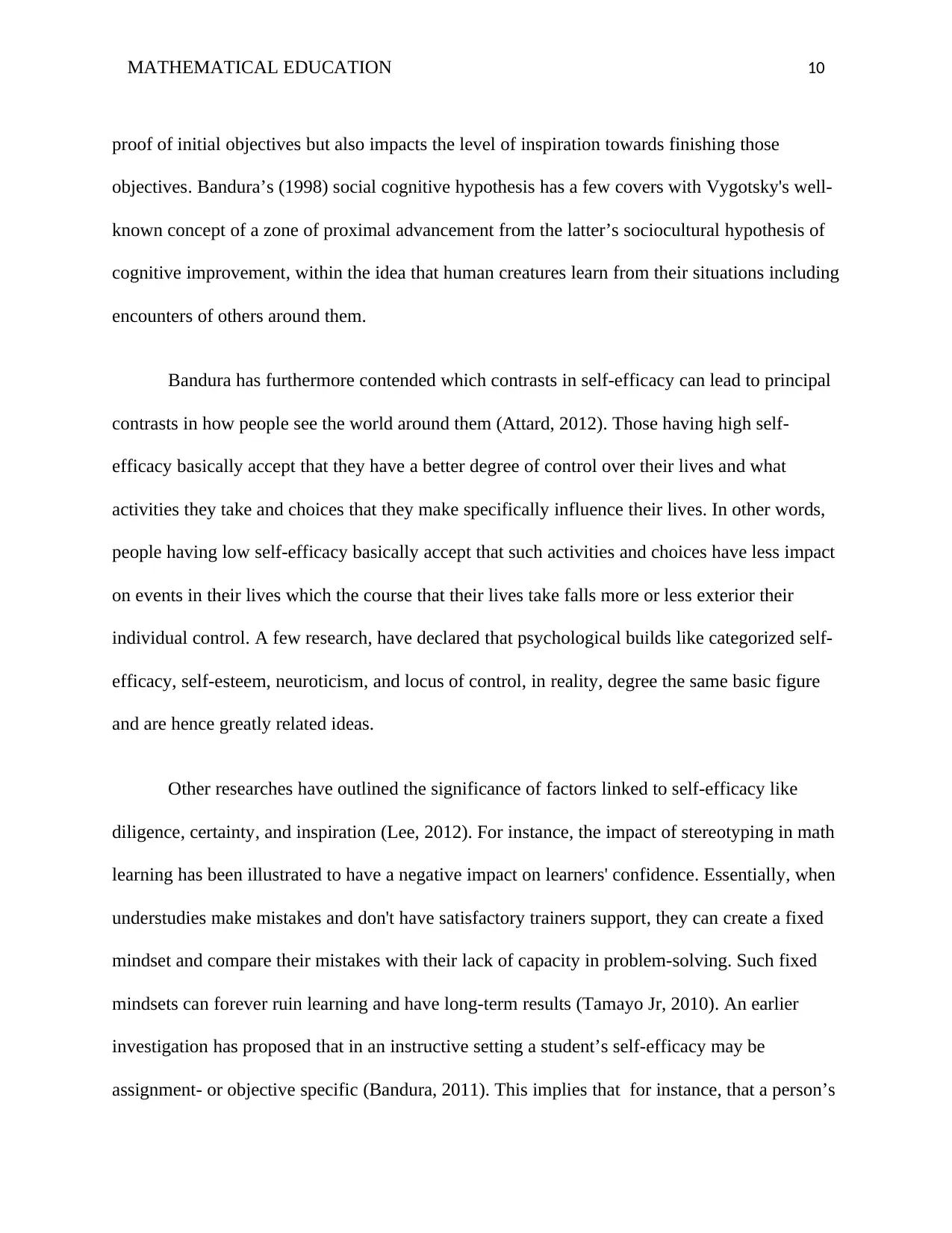
MATHEMATICAL EDUCATION 10
proof of initial objectives but also impacts the level of inspiration towards finishing those
objectives. Bandura’s (1998) social cognitive hypothesis has a few covers with Vygotsky's well-
known concept of a zone of proximal advancement from the latter’s sociocultural hypothesis of
cognitive improvement, within the idea that human creatures learn from their situations including
encounters of others around them.
Bandura has furthermore contended which contrasts in self-efficacy can lead to principal
contrasts in how people see the world around them (Attard, 2012). Those having high self-
efficacy basically accept that they have a better degree of control over their lives and what
activities they take and choices that they make specifically influence their lives. In other words,
people having low self-efficacy basically accept that such activities and choices have less impact
on events in their lives which the course that their lives take falls more or less exterior their
individual control. A few research, have declared that psychological builds like categorized self-
efficacy, self-esteem, neuroticism, and locus of control, in reality, degree the same basic figure
and are hence greatly related ideas.
Other researches have outlined the significance of factors linked to self-efficacy like
diligence, certainty, and inspiration (Lee, 2012). For instance, the impact of stereotyping in math
learning has been illustrated to have a negative impact on learners' confidence. Essentially, when
understudies make mistakes and don't have satisfactory trainers support, they can create a fixed
mindset and compare their mistakes with their lack of capacity in problem-solving. Such fixed
mindsets can forever ruin learning and have long-term results (Tamayo Jr, 2010). An earlier
investigation has proposed that in an instructive setting a student’s self-efficacy may be
assignment- or objective specific (Bandura, 2011). This implies that for instance, that a person’s
proof of initial objectives but also impacts the level of inspiration towards finishing those
objectives. Bandura’s (1998) social cognitive hypothesis has a few covers with Vygotsky's well-
known concept of a zone of proximal advancement from the latter’s sociocultural hypothesis of
cognitive improvement, within the idea that human creatures learn from their situations including
encounters of others around them.
Bandura has furthermore contended which contrasts in self-efficacy can lead to principal
contrasts in how people see the world around them (Attard, 2012). Those having high self-
efficacy basically accept that they have a better degree of control over their lives and what
activities they take and choices that they make specifically influence their lives. In other words,
people having low self-efficacy basically accept that such activities and choices have less impact
on events in their lives which the course that their lives take falls more or less exterior their
individual control. A few research, have declared that psychological builds like categorized self-
efficacy, self-esteem, neuroticism, and locus of control, in reality, degree the same basic figure
and are hence greatly related ideas.
Other researches have outlined the significance of factors linked to self-efficacy like
diligence, certainty, and inspiration (Lee, 2012). For instance, the impact of stereotyping in math
learning has been illustrated to have a negative impact on learners' confidence. Essentially, when
understudies make mistakes and don't have satisfactory trainers support, they can create a fixed
mindset and compare their mistakes with their lack of capacity in problem-solving. Such fixed
mindsets can forever ruin learning and have long-term results (Tamayo Jr, 2010). An earlier
investigation has proposed that in an instructive setting a student’s self-efficacy may be
assignment- or objective specific (Bandura, 2011). This implies that for instance, that a person’s
Paraphrase This Document
Need a fresh take? Get an instant paraphrase of this document with our AI Paraphraser
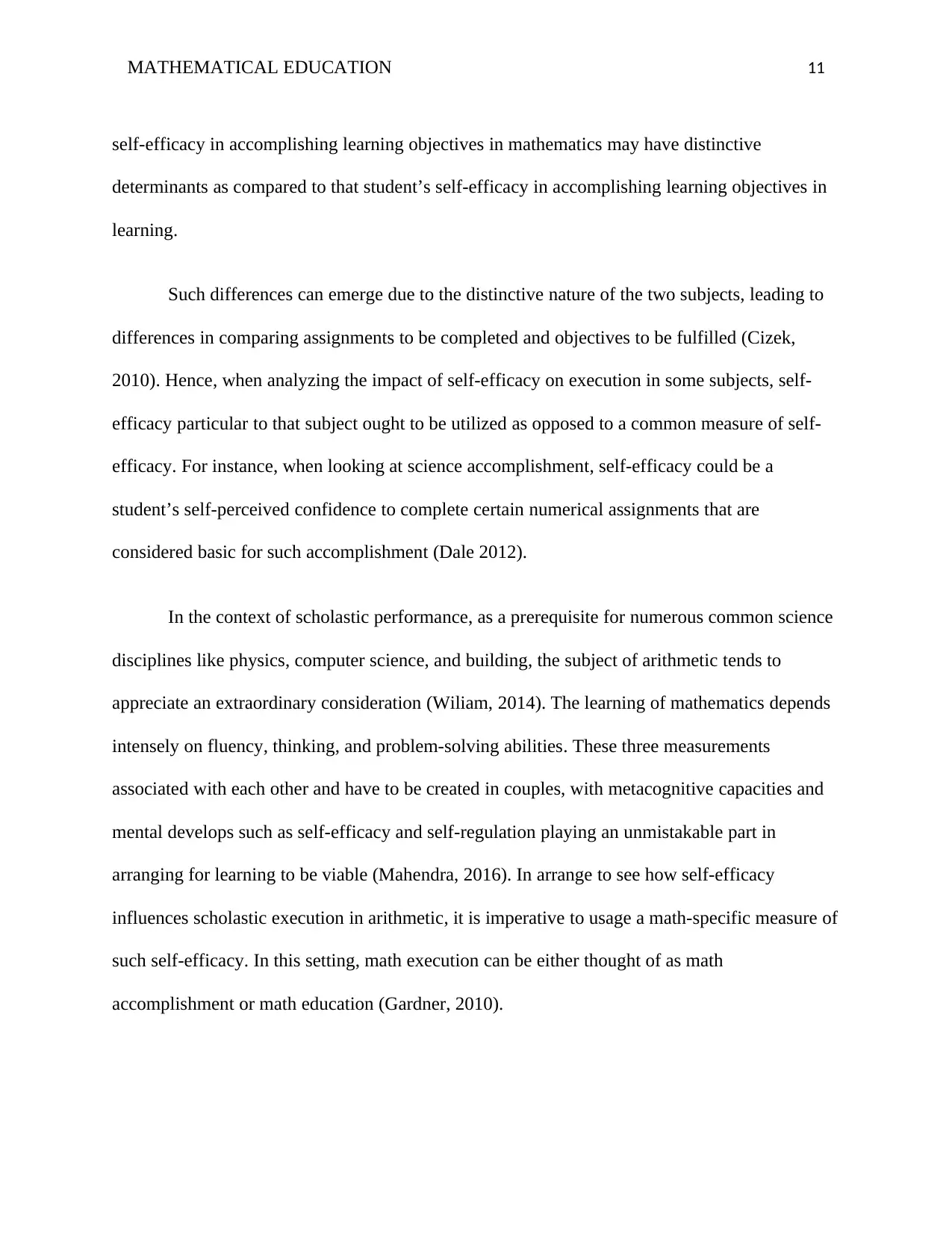
MATHEMATICAL EDUCATION 11
self-efficacy in accomplishing learning objectives in mathematics may have distinctive
determinants as compared to that student’s self-efficacy in accomplishing learning objectives in
learning.
Such differences can emerge due to the distinctive nature of the two subjects, leading to
differences in comparing assignments to be completed and objectives to be fulfilled (Cizek,
2010). Hence, when analyzing the impact of self-efficacy on execution in some subjects, self-
efficacy particular to that subject ought to be utilized as opposed to a common measure of self-
efficacy. For instance, when looking at science accomplishment, self-efficacy could be a
student’s self-perceived confidence to complete certain numerical assignments that are
considered basic for such accomplishment (Dale 2012).
In the context of scholastic performance, as a prerequisite for numerous common science
disciplines like physics, computer science, and building, the subject of arithmetic tends to
appreciate an extraordinary consideration (Wiliam, 2014). The learning of mathematics depends
intensely on fluency, thinking, and problem-solving abilities. These three measurements
associated with each other and have to be created in couples, with metacognitive capacities and
mental develops such as self-efficacy and self-regulation playing an unmistakable part in
arranging for learning to be viable (Mahendra, 2016). In arrange to see how self-efficacy
influences scholastic execution in arithmetic, it is imperative to usage a math-specific measure of
such self-efficacy. In this setting, math execution can be either thought of as math
accomplishment or math education (Gardner, 2010).
self-efficacy in accomplishing learning objectives in mathematics may have distinctive
determinants as compared to that student’s self-efficacy in accomplishing learning objectives in
learning.
Such differences can emerge due to the distinctive nature of the two subjects, leading to
differences in comparing assignments to be completed and objectives to be fulfilled (Cizek,
2010). Hence, when analyzing the impact of self-efficacy on execution in some subjects, self-
efficacy particular to that subject ought to be utilized as opposed to a common measure of self-
efficacy. For instance, when looking at science accomplishment, self-efficacy could be a
student’s self-perceived confidence to complete certain numerical assignments that are
considered basic for such accomplishment (Dale 2012).
In the context of scholastic performance, as a prerequisite for numerous common science
disciplines like physics, computer science, and building, the subject of arithmetic tends to
appreciate an extraordinary consideration (Wiliam, 2014). The learning of mathematics depends
intensely on fluency, thinking, and problem-solving abilities. These three measurements
associated with each other and have to be created in couples, with metacognitive capacities and
mental develops such as self-efficacy and self-regulation playing an unmistakable part in
arranging for learning to be viable (Mahendra, 2016). In arrange to see how self-efficacy
influences scholastic execution in arithmetic, it is imperative to usage a math-specific measure of
such self-efficacy. In this setting, math execution can be either thought of as math
accomplishment or math education (Gardner, 2010).
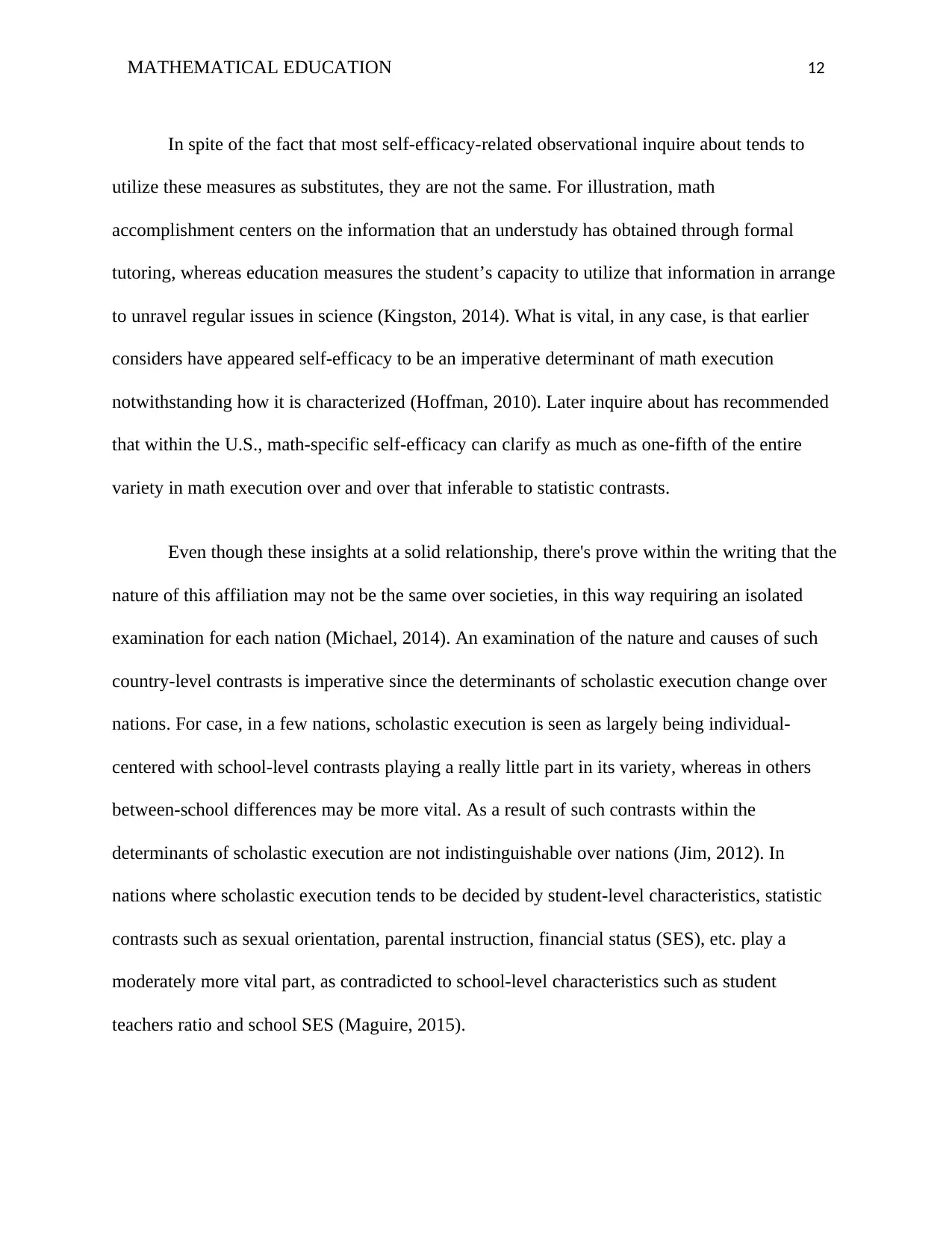
MATHEMATICAL EDUCATION 12
In spite of the fact that most self-efficacy-related observational inquire about tends to
utilize these measures as substitutes, they are not the same. For illustration, math
accomplishment centers on the information that an understudy has obtained through formal
tutoring, whereas education measures the student’s capacity to utilize that information in arrange
to unravel regular issues in science (Kingston, 2014). What is vital, in any case, is that earlier
considers have appeared self-efficacy to be an imperative determinant of math execution
notwithstanding how it is characterized (Hoffman, 2010). Later inquire about has recommended
that within the U.S., math-specific self-efficacy can clarify as much as one-fifth of the entire
variety in math execution over and over that inferable to statistic contrasts.
Even though these insights at a solid relationship, there's prove within the writing that the
nature of this affiliation may not be the same over societies, in this way requiring an isolated
examination for each nation (Michael, 2014). An examination of the nature and causes of such
country-level contrasts is imperative since the determinants of scholastic execution change over
nations. For case, in a few nations, scholastic execution is seen as largely being individual-
centered with school-level contrasts playing a really little part in its variety, whereas in others
between-school differences may be more vital. As a result of such contrasts within the
determinants of scholastic execution are not indistinguishable over nations (Jim, 2012). In
nations where scholastic execution tends to be decided by student-level characteristics, statistic
contrasts such as sexual orientation, parental instruction, financial status (SES), etc. play a
moderately more vital part, as contradicted to school-level characteristics such as student
teachers ratio and school SES (Maguire, 2015).
In spite of the fact that most self-efficacy-related observational inquire about tends to
utilize these measures as substitutes, they are not the same. For illustration, math
accomplishment centers on the information that an understudy has obtained through formal
tutoring, whereas education measures the student’s capacity to utilize that information in arrange
to unravel regular issues in science (Kingston, 2014). What is vital, in any case, is that earlier
considers have appeared self-efficacy to be an imperative determinant of math execution
notwithstanding how it is characterized (Hoffman, 2010). Later inquire about has recommended
that within the U.S., math-specific self-efficacy can clarify as much as one-fifth of the entire
variety in math execution over and over that inferable to statistic contrasts.
Even though these insights at a solid relationship, there's prove within the writing that the
nature of this affiliation may not be the same over societies, in this way requiring an isolated
examination for each nation (Michael, 2014). An examination of the nature and causes of such
country-level contrasts is imperative since the determinants of scholastic execution change over
nations. For case, in a few nations, scholastic execution is seen as largely being individual-
centered with school-level contrasts playing a really little part in its variety, whereas in others
between-school differences may be more vital. As a result of such contrasts within the
determinants of scholastic execution are not indistinguishable over nations (Jim, 2012). In
nations where scholastic execution tends to be decided by student-level characteristics, statistic
contrasts such as sexual orientation, parental instruction, financial status (SES), etc. play a
moderately more vital part, as contradicted to school-level characteristics such as student
teachers ratio and school SES (Maguire, 2015).
⊘ This is a preview!⊘
Do you want full access?
Subscribe today to unlock all pages.

Trusted by 1+ million students worldwide
1 out of 61
Your All-in-One AI-Powered Toolkit for Academic Success.
+13062052269
info@desklib.com
Available 24*7 on WhatsApp / Email
![[object Object]](/_next/static/media/star-bottom.7253800d.svg)
Unlock your academic potential
Copyright © 2020–2026 A2Z Services. All Rights Reserved. Developed and managed by ZUCOL.